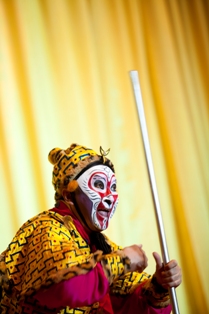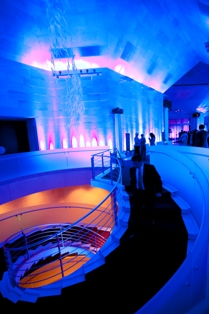On the evening of May 7th, more than 800 international dignitaries and Washington socialites were treated to an astounding blend of contemporary and ancient Chinese culture at the Washington National Opera’s annual Opera Ball. As we covered in the spring issue, this year’s ball was hosted by His Excellency the Ambassador of the People’s Republic of China Zhang Yesui and Madame Chen Naiqing, marking the first time the Embassy of the People’s Republic of China has hosted the event. This year’s Ball was also a tribute to the world-renowned tenor and WNO Director Plácido Domingo, who will be leaving his position at the helm of the organization after 15 years.
For those attending the event, it was obvious it would be a very special night. Philanthropist and Chair Susan Lehrman was the woman behind the spectacular event. Opera Ball 2011 was one of the most successful events to date, raising $2.6 million for the company and with more than 800 guests it smashed all previous attendance records.
Guests began their grand evening with a beloved Opera Ball tradition: a formal dinner at one of 30 embassies across Washington, DC, that hosted the elegant precursor to the Ball. This year, the participating embassies were Singapore, Morocco, Oman, Germany, Mexico, Kazakhstan, Egypt, Ireland, Estonia, the United Kingdom, Romania, Croatia, Luxembourg, the Netherlands, Barbados, Peru, India, Malaysia, Brunei, Italy, Brazil, Uzbekistan, Chile, Indonesia, Columbia, Switzerland, France, Monaco, Hungary, and the Organization of American States. Guests attending this rare opportunity were presented with a bound tribute book dedicated to Maestro Domingo, as well as an exquisite pen holder, crafted especially for the Opera Ball, as a gift from the Cultural Offices of the People’s Republic of China.

Following dinner, guests proceeded to the ceremonial building of the Chancery of the Embassy of the Republic of China. Opened in 2008, the majestic structure was designed by Chinese-American architect I.M. Pei to blend ancient and modern traditions. As guests arrived in the Grand Foyer, they were greeted with the spectacular display of a laser light show, complemented with Plum Blossom Cocktails and modern Chinese hors d’oeuvres. As guests passed through the receiving line, they circled around a massive fou drum – Drum Number 1410 of 1500 fou drums played in the Beijing Olympic Ceremonies and brought to the U.S. especially for the Opera Ball.
As the light show concluded with a stunning image of the Forbidden City, a Chinese gong sounded, signaling for guests to descend the grand staircase into an ethereal scene of ancient China.
After passing through a pagoda, guests entered the “Palace of Established Happiness,” a tranquil Chinese garden with Bonsai trees and rock formations. The path continued under fretwork moon arches and past Chinese foo dogs guarding the entrance to the grand ballroom, which had been transformed into an elegant Tea Room, the traditional setting for entertaining honored guests in ancient China.

The ballroom entertainment was provided by Floating Opera with Glenn Pearson and later in the evening, 6ix Wire Project performed excerpts from beloved operas in an East-meets-West classical crossover style. Guests including Rep. Dennis and Elizabeth Kucinich, Sen. Patrick and Marcelle Leahy, Justice Ruth Bader Ginsburg, Chief Justice John Roberts, Sen. Richard Shelby, Rep. Ed Royce and patron of the arts Lucky Roosevelt, danced to such classic tunes as “Moon River,” as well as pieces from the beloved opera, Carmen. The Washington-based Peking Opera Workshop also gave informal performances throughout the evening to spotlight the authentic musical and theatrical techniques unique to Peking opera. Twice during the night, singers from China’s Tianjin Youth Peking Opera Troupe performed traditional Peking Opera favorites. To further highlight the unique tradition of Peking opera productions, costumes were showcased throughout the Chancery.
Four dessert stations and bars lined the outer edge of the ballroom, while butlers passed cocktails, wine, and champagne to dancers throughout the crowd. If guests did not feel like dancing, there were options to visit the Gold Room, where 10 chefs prepared and masterfully carved mouthwatering Peking ducks, the national food of China. In the Tea Room, guests were seated and sampled a variety of teas and scrumptious Chinese sweets, and in the Tapestry Room, guests received scrolls with their names inscribed in traditional Chinese calligraphy, while a video tribute to Maestro Domingo played on two large screens.
The event became an all-night fête, as the first opera performances did not even begin until nearly midnight. After remarks by Ambassador Zhang Yesui, Italian bass-baritone Simone Alberghini serenaded Maestro Domingo with a song written especially for the occasion to the tune of “Thanks for the Memories.” Yingxi Zhang, a tenor from Shanghai who studied under Maestro Domingo, followed with a tribute performance to his mentor.
As the evening began to come to a close, guests departed through a tunnel of 999 red Chinese lanterns, symbols of good luck. Under Susan Lehrman’s competent hand, the Opera Ball does not need luck to be the event of the year or to be remembered for years to come.
PHOTOS: All photos are courtesy of the Washington National Opera and the Opera Ball 2011. All rights reserved.


a global affairs media network
Opera Ball 2011: Spectacular Meets Cultural Diplomacy

May 20, 2010
On the evening of May 7th, more than 800 international dignitaries and Washington socialites were treated to an astounding blend of contemporary and ancient Chinese culture at the Washington National Opera’s annual Opera Ball. As we covered in the spring issue, this year’s ball was hosted by His Excellency the Ambassador of the People’s Republic of China Zhang Yesui and Madame Chen Naiqing, marking the first time the Embassy of the People’s Republic of China has hosted the event. This year’s Ball was also a tribute to the world-renowned tenor and WNO Director Plácido Domingo, who will be leaving his position at the helm of the organization after 15 years.
For those attending the event, it was obvious it would be a very special night. Philanthropist and Chair Susan Lehrman was the woman behind the spectacular event. Opera Ball 2011 was one of the most successful events to date, raising $2.6 million for the company and with more than 800 guests it smashed all previous attendance records.
Guests began their grand evening with a beloved Opera Ball tradition: a formal dinner at one of 30 embassies across Washington, DC, that hosted the elegant precursor to the Ball. This year, the participating embassies were Singapore, Morocco, Oman, Germany, Mexico, Kazakhstan, Egypt, Ireland, Estonia, the United Kingdom, Romania, Croatia, Luxembourg, the Netherlands, Barbados, Peru, India, Malaysia, Brunei, Italy, Brazil, Uzbekistan, Chile, Indonesia, Columbia, Switzerland, France, Monaco, Hungary, and the Organization of American States. Guests attending this rare opportunity were presented with a bound tribute book dedicated to Maestro Domingo, as well as an exquisite pen holder, crafted especially for the Opera Ball, as a gift from the Cultural Offices of the People’s Republic of China.

Following dinner, guests proceeded to the ceremonial building of the Chancery of the Embassy of the Republic of China. Opened in 2008, the majestic structure was designed by Chinese-American architect I.M. Pei to blend ancient and modern traditions. As guests arrived in the Grand Foyer, they were greeted with the spectacular display of a laser light show, complemented with Plum Blossom Cocktails and modern Chinese hors d’oeuvres. As guests passed through the receiving line, they circled around a massive fou drum – Drum Number 1410 of 1500 fou drums played in the Beijing Olympic Ceremonies and brought to the U.S. especially for the Opera Ball.
As the light show concluded with a stunning image of the Forbidden City, a Chinese gong sounded, signaling for guests to descend the grand staircase into an ethereal scene of ancient China.
After passing through a pagoda, guests entered the “Palace of Established Happiness,” a tranquil Chinese garden with Bonsai trees and rock formations. The path continued under fretwork moon arches and past Chinese foo dogs guarding the entrance to the grand ballroom, which had been transformed into an elegant Tea Room, the traditional setting for entertaining honored guests in ancient China.

The ballroom entertainment was provided by Floating Opera with Glenn Pearson and later in the evening, 6ix Wire Project performed excerpts from beloved operas in an East-meets-West classical crossover style. Guests including Rep. Dennis and Elizabeth Kucinich, Sen. Patrick and Marcelle Leahy, Justice Ruth Bader Ginsburg, Chief Justice John Roberts, Sen. Richard Shelby, Rep. Ed Royce and patron of the arts Lucky Roosevelt, danced to such classic tunes as “Moon River,” as well as pieces from the beloved opera, Carmen. The Washington-based Peking Opera Workshop also gave informal performances throughout the evening to spotlight the authentic musical and theatrical techniques unique to Peking opera. Twice during the night, singers from China’s Tianjin Youth Peking Opera Troupe performed traditional Peking Opera favorites. To further highlight the unique tradition of Peking opera productions, costumes were showcased throughout the Chancery.
Four dessert stations and bars lined the outer edge of the ballroom, while butlers passed cocktails, wine, and champagne to dancers throughout the crowd. If guests did not feel like dancing, there were options to visit the Gold Room, where 10 chefs prepared and masterfully carved mouthwatering Peking ducks, the national food of China. In the Tea Room, guests were seated and sampled a variety of teas and scrumptious Chinese sweets, and in the Tapestry Room, guests received scrolls with their names inscribed in traditional Chinese calligraphy, while a video tribute to Maestro Domingo played on two large screens.
The event became an all-night fête, as the first opera performances did not even begin until nearly midnight. After remarks by Ambassador Zhang Yesui, Italian bass-baritone Simone Alberghini serenaded Maestro Domingo with a song written especially for the occasion to the tune of “Thanks for the Memories.” Yingxi Zhang, a tenor from Shanghai who studied under Maestro Domingo, followed with a tribute performance to his mentor.
As the evening began to come to a close, guests departed through a tunnel of 999 red Chinese lanterns, symbols of good luck. Under Susan Lehrman’s competent hand, the Opera Ball does not need luck to be the event of the year or to be remembered for years to come.
PHOTOS: All photos are courtesy of the Washington National Opera and the Opera Ball 2011. All rights reserved.


